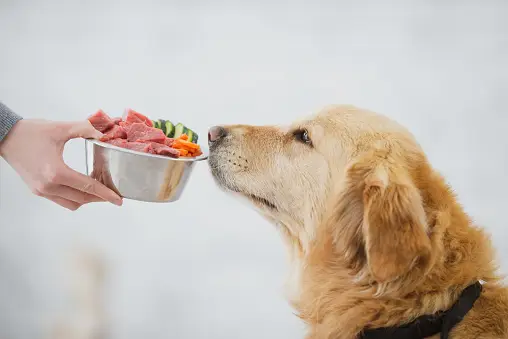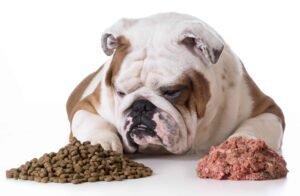Raw dog food is a popular option for senior dogs, as it contains natural ingredients and provides numerous health benefits. This article will discuss the best raw dog food options for older dogs, highlighting essential factors to consider to keep your furry friend healthy and happy. Switching to a raw diet can improve your dog’s quality of life and add years to their life.

Understanding the Benefits of Raw Dog Food for Senior Dogs
The Importance of Tailoring Your Aging Dog’s Diet
Aging dogs require a specialized diet to support their aging bodies and maintain optimal health. First, let’s delve into the numerous advantages that raw dog food offers older dogs.
1. Improved Digestion: Raw dog food is easier to digest than processed kibble, making it beneficial for those with sensitive stomachs or digestive problems.
2. Enhanced Nutrient Absorption: Raw dog food is packed with natural enzymes and nutrients, which can easily be absorbed to support their immune system, joint health, and overall vitality.
3. Weight Management: A raw diet can help aging dogs maintain a healthy weight by providing balanced nutrition without fillers or additives.
4. Dental Health: Raw bones and meat can help keep dogs’ teeth clean and healthy.
5. Increased Energy and Vitality: Raw dog food provides high-quality proteins and fats that help maintain muscle mass and stay active.
Consider raw dog food for your senior dog for a healthier, more natural option. You can help your loved ones maintain a healthy and active lifestyle by giving them proper nutrients. Trust me, your dog will thank you for making the switch!

Critical Nutrients for Senior Dogs
Protein and Its Role
Protein is essential for seniors to maintain muscle mass and overall vitality.
Healthy Fats for Joint Health and Cognitive Function
Omega-3 fatty acids support senior dogs’ joint health and cognitive function.
Common Health Issues in Senior Dogs and How Nutrition Can Help
Arthritis and Joint Support
Arthritis is a common issue in older dogs, and proper nutrition can help alleviate symptoms and improve mobility.
Dental Health and Digestive Support
Senior dogs may experience dental issues and digestive sensitivities, making choosing food that promotes oral and digestive health essential.

Factors to Consider When Selecting Senior Dog Food
Protein Quality and Quantity: Senior dogs need high-quality protein for muscle mass, organ function, and overall health. Choose easily digestible protein in their raw food.
Balanced Nutrient Profile: Find a raw food formula for senior dogs with balanced essential nutrients to support aging organs and systems.
Joint Support Ingredients: Raw food with glucosamine and chondroitin can help alleviate arthritis symptoms and maintain joint health in senior dogs.
Natural Fat Sources: Healthy fats, like omega-3 and omega-6 fatty acids in fish oil or flaxseed, are essential for senior dogs’ energy, skin, and coat health.
Minimized Additives: Aging dogs may benefit from a raw diet with minimal additives, preservatives, and artificial ingredients to reduce the risk of gastrointestinal issues.
Whole, Real Ingredients: Choose raw dog food with natural ingredients like meats, fruits, and vegetables to avoid fillers and by-products.
Texture and Palatability: Choose raw food that suits your dog’s dental health and flavor preference.
Transition Period: Gradually introduce a raw food diet to help your dog’s digestion adjust. Keep an eye out for any allergies or sensitivities during the transition.


Transitioning Your Senior Dog to a New Diet
Here are some tips for a Smooth Transition
1. When transitioning a senior dog to a raw food diet, it’s essential to consult with a veterinarian first. A gradual transition can help prevent digestive issues and ensure they adjust well to the new food.
2. Gradually introduce raw food to your dog’s diet by mixing it with their old food. Start with a small amount and increase the ratio of raw food over 7-10 days to prevent digestive upset. Adding probiotics can also be helpful.
3. For your senior dog’s raw food, choose high-quality human-grade ingredients that include a balanced mix of meat, bones, organs, and veggies to ensure they get the essential nutrients they need.
4. Monitor your dog’s health and behavior during the transition. Look for changes in digestion, energy levels, or allergies. If you have concerns, consult your veterinarian.
5. Keep your dog hydrated by providing fresh water, even if they are on a raw diet with higher moisture content than dry kibble.
6. Adjust portion sizes based on weight When transitioning your senior dog to a raw food diet. Older dogs have different nutritional needs, so it’s important to customize their diet.
Please consult your vet while transitioning your senior dog to a raw diet for their well-being.

Safe Handling and Storage of Raw Food
Proper Storage: Store raw food properly to avoid harmful bacteria growth. Freeze it until use and thaw in the fridge to minimize bacterial growth. Follow the manufacturer’s storage guidelines.
Hygiene Practices: Wash your hands and clean surfaces and utensils after handling raw dog food to prevent cross-contamination.


Balancing a senior dog’s raw diet is crucial for meeting their nutritional needs. Dog owners may need help with the cost and time required to provide natural food. Please consider potential challenges before feeding your senior dog a raw diet and explore alternative options if you need them.
In general, there are legitimate worries about giving raw food to older dogs. A safe and nutritious raw diet can benefit senior dogs with proper research, consultation with a veterinarian, and individual consideration.
A raw dog food diet can improve the health of aging dogs by catering to their specific dietary needs. It helps maintain optimal weight, promote joint health, and bolster the immune system.
A raw diet offers a natural and biologically appropriate way to address the changing nutritional requirements of senior dogs. Quality and balanced ingredients can promote the longevity and vitality of old dogs.
Committing to providing exceptional care allows seniors to age gracefully and enjoy their golden years.
FAQ
Is raw dog food safe for senior dogs?
Raw dog food can be safe for seniors when sourced from reputable brands, prepared, and handled correctly.
Is a raw diet suitable for senior dogs?
A raw diet can benefit senior dogs by giving them essential nutrients and promoting overall health. However, you must consult your veterinarian to ensure it meets your dog’s needs.
What are the benefits of feeding raw food to senior dogs?
Raw dog food can improve joint health and weight management, enhance digestion, and strengthen the immune system in senior dogs. It may also alleviate specific age-related issues.
How do I know if my senior dog benefits from a raw diet
Look for signs of improved energy levels, coat quality, and overall vitality in your old dog to gauge the help of a raw diet.
How do I transition my senior dog to a raw diet?
A gradual transition is critical. Start by mixing a small amount of raw food with the current diet and gradually increase the proportion over several days to allow their digestive system to adjust.
What types of raw food are suitable for senior dogs?
Include a variety of proteins like lean meats, organs, and bones. There are many knowledgeable nutritionists for dogs who can help you determine the right balance. Also, consider adding supplements such as fish oil for omega-3 fatty acids.
Are there any concerns with feeding raw food to senior dogs?
Contamination is a potential risk, so handle raw food safely to avoid bacterial issues. Also, please ensure the diet is well-balanced to meet your dog’s nutritional requirements.
Can a raw diet help manage common senior dog health issues?
A well-formulated raw diet may help manage arthritis, obesity, and dental problems. However, individual cases vary, and consulting with your vet is essential.
How can I ensure my senior dog gets the proper nutrients?
I’d like you to work closely with your veterinarian to create a balanced diet tailored to your dog’s needs. Regular check-ups can help monitor their health and make adjustments as necessary.
Should I consider supplements for my senior dog on a raw diet?
Depending on your dog’s health and the specific raw diet, your vet may recommend supplements such as vitamins, minerals, or joint support to ensure comprehensive nutrition.
Are there senior-specific considerations for raw feeding?
Yes, seniors may have reduced activity levels and different dietary requirements. Adjust portion sizes accordingly and monitor their weight to prevent obesity or malnutrition.
Can I combine commercial senior dog food with a raw diet?
Yes, it’s possible to combine both but ensure the overall diet is balanced. Please discuss this approach with your veterinarian to determine the best health strategy for your senior dog.





Pingback: Is Your Dog's Gut Health in Danger? Unlock the Secret!